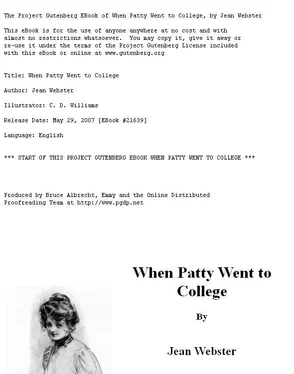Jean Webster - When Patty Went to College
Здесь есть возможность читать онлайн «Jean Webster - When Patty Went to College» весь текст электронной книги совершенно бесплатно (целиком полную версию без сокращений). В некоторых случаях можно слушать аудио, скачать через торрент в формате fb2 и присутствует краткое содержание. Год выпуска: 2007, Жанр: Классическая проза, на английском языке. Описание произведения, (предисловие) а так же отзывы посетителей доступны на портале библиотеки ЛибКат.
- Название:When Patty Went to College
- Автор:
- Жанр:
- Год:2007
- ISBN:нет данных
- Рейтинг книги:4 / 5. Голосов: 1
-
Избранное:Добавить в избранное
- Отзывы:
-
Ваша оценка:
- 80
- 1
- 2
- 3
- 4
- 5
When Patty Went to College: краткое содержание, описание и аннотация
Предлагаем к чтению аннотацию, описание, краткое содержание или предисловие (зависит от того, что написал сам автор книги «When Patty Went to College»). Если вы не нашли необходимую информацию о книге — напишите в комментариях, мы постараемся отыскать её.
When Patty Went to College — читать онлайн бесплатно полную книгу (весь текст) целиком
Ниже представлен текст книги, разбитый по страницам. Система сохранения места последней прочитанной страницы, позволяет с удобством читать онлайн бесплатно книгу «When Patty Went to College», без необходимости каждый раз заново искать на чём Вы остановились. Поставьте закладку, и сможете в любой момент перейти на страницу, на которой закончили чтение.
Интервал:
Закладка:
Owing to the pressure of many interests, Patty's researches into philosophy were not as deep as the intentions of the course, but she had a very good working knowledge, which, in its details, would have astonished Professor Cairnsley could he have got behind the scenes. Though her knowledge was not based strictly on the text-book, her reputation in the class was good, and, as Patty admitted with a sigh, "It's a great strain on the imagination to keep up a reputation in philosophy."
It had been established, indeed, as far back as her sophomore year, when the psychology class was awed into silence by its first introduction to the abstractions of science, and Patty alone had dared to lift her voice. The professor, one morning, had been placidly lecturing along on the subject of sensation, and in the course of the lecture had remarked: "It is probable that the individual experiences all the primary sensations during the first few months of infancy, and that in after life there is no such thing as a new sensation."
"Professor Cairnsley," Patty piped up, "did you ever shoot the chutes?"
The ice was broken at last, and the class felt at home, even in the somewhat deep waters of philosophy; and Patty, however undeservedly, had gained the credit of having a deeper insight than most into matters psychical.
And so into her senior year, when she entered upon the study of ethics, she carried along an unearned and fragile reputation, built upon subterfuges and likely to crumble at the slightest touch. She had maintained it very creditably up to the Christmas vacation, and had argued upon the ultimate ground of moral obligation and the origin of conscience quite as intelligently as though she had previously read what the text-book had to say on the subject. But when they had commenced the study of specific theologies, based upon definite historical facts, Patty found her imagination of little use, and on several occasions it had been purely good luck that had saved her from exposure. Once the bell had rung at an opportune moment, and twice she had been able to avert a direct answer by leading the discussion into side issues. She realized, however, that fortune would not always favor her, and as the professor usually forgot to call the roll, she formed the nefarious practice of cutting class when she did not have her lesson.
For a week or so in particular, her pressure of work in other directions (not all of them scholastic) had prevented her from devoting her usual amount of energy to the task of maintaining her philosophy reputation, and she had, without conscience, cut ethics several days in succession, and had failed to comment upon the fact to the professor.
"What did he lecture about in ethics—those recitations I missed?" she inquired of Priscilla, one afternoon.
"Swedenborg."
"Swedenborg," repeated Patty, dreamily. "He got up a new religion, didn't he? Or was it a new system of gymnastics? I've heard about him, but I don't seem to remember any details."
"You'd better make him up; he's important."
"I dare say; but I've lived twenty-one years without knowing about him, and I can wait a month longer. I'm saving up Confucius and the Jesuits for examination-time, and I'll add Swedenborg to the list."
"You'd better not. Professor Cairnsley's fond of him, and is likely to pop a special examination at any moment."
"Not Professor Cairnsley," laughed Patty. "He doesn't want to waste the time. He's going to lecture straight on for two weeks—nice man; I see it in his eye. What I admire in a professor is a good, steady, plodding disposition that doesn't go in for sensational surprises."
"You'll find yourself mistaken some day," warned Priscilla.
"No danger, my dear Cassandra. I know Professor Cairnsley, and Professor Cairnsley thinks he knows me; and we just get along together beautifully. I wish there were more like him," Patty added with a sigh.
Professor Cairnsley began a lecture the next morning which was evidently calculated to extend through the hour, and Patty cast a triumphant glance at Priscilla as she unscrewed the top of her fountain-pen and settled down to work. In the course of the lecture, however, he had occasion to refer to Swedenborg, and, pausing a moment, he casually asked a girl on the front seat for a résumé of Swedenborg's philosophy. She, unfortunately confusing him with Schopenhauer, glibly attributed to him doctrines which would have outraged his soul could he have heard them. It is written that the worm will turn, and the professor's bland smile deserted him as he passed the question to a second girl without much better result. The class in general had evidently been laboring under Patty's delusion that the time had not come in which to learn back notes. Amazed and indignant, he pursued the matter with a persistency and a rancor he seldom showed. He began going straight through the class, growing more and more sarcastic with each recitation.
As she saw him finish with the row in front and begin on her row, Patty knew that she was doomed. She racked her brain for some memory of Swedenborg. He was a name to her and nothing more. He might have been an ancient Greek or a modern American, for all she knew. As Professor Cairnsley came along the line he was gradually eliciting from the terrified class the superficial points which were more or less common to all philosophers. Patty perceived that her imagination could not help her out, that for once the placid professor was on the war-path, and that Swedenborg, and nothing but Swedenborg, would serve. She cast an agonized glance up at Priscilla, and Priscilla grinned back with "I told you so" written on every feature.
Patty looked about desperately. The lecture-room was shaped like an amphitheater, with part of the seats on a level with the main floor, and the rest rising in tiers. Patty sat on the main floor, well toward the rear. She could barely see the professor's head, but he was coming irrevocably. She did not have to see very clearly to know that. The girl before her answered wildly; the professor frowned, and, looking down at his roll-book, slowly and deliberately made a zero.
When he raised his eyes again Patty's seat was empty. She was kneeling on the floor, with her head bowed behind the girl in front. The unconscious professor passed over her bent head and called on the girl on the other side, who coughed hysterically once or twice, and flunked flat; and while he was crediting the fact in his roll-book Patty resumed her seat. A ripple of laughter ran around the room; the professor frowned, and remarked that he saw no occasion for amusement. The bell rang, and the class somewhat sheepishly filed out.
That afternoon Patty burst into the study where Priscilla and Georgie Merriles were making tea. "Did you ever think I had much of a conscience?" she demanded.
"Never thought it was your strong point," said Georgie.
"Well, I've got a perfectly tremendous one! What do you think I've been doing?"
"Making up your ethics lectures," suggested Priscilla.
"Worse than that."
"You haven't been to gym, Patty!" said Georgie.
"Goodness, no! I'm not so far gone as that. Well, I'll tell you. I met Professor Cairnsley by the gate and walked in with him, and, if you please, he complimented me on my work in ethics!"
"That ought to have been embarrassing," said Georgie.
"It was," acknowledged Patty. "I told him I didn't really know as much as he thought I did."
"What did he say?"
"He said I was too modest. He's such a trustful old man, you know, that you sort of hate to deceive him. And what do you think? I told him about the seat!"
Priscilla smiled approvingly upon her usually recreant room-mate. "Well, Patty, you certainly are better than I gave you credit for!"
"Thank you," murmured Patty.
"I begin to believe you have got a conscience," said Georgie.
Читать дальшеИнтервал:
Закладка:
Похожие книги на «When Patty Went to College»
Представляем Вашему вниманию похожие книги на «When Patty Went to College» списком для выбора. Мы отобрали схожую по названию и смыслу литературу в надежде предоставить читателям больше вариантов отыскать новые, интересные, ещё непрочитанные произведения.
Обсуждение, отзывы о книге «When Patty Went to College» и просто собственные мнения читателей. Оставьте ваши комментарии, напишите, что Вы думаете о произведении, его смысле или главных героях. Укажите что конкретно понравилось, а что нет, и почему Вы так считаете.












